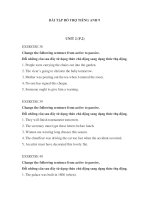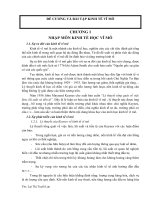bai tap nhom2x
Bạn đang xem bản rút gọn của tài liệu. Xem và tải ngay bản đầy đủ của tài liệu tại đây (3.24 MB, 31 trang )
PARTS OF SPEECH
WORD FAMILIES
GROUP 9:
1. LÊ CẨM GIANG
2. NGUYỄN THỊ NGA
3. LƯU THỊ PHƯƠNG DUNG
4. NGUYỄN VÕ PHƯƠNG TRANG
Contents
The Parts of speech
1
Word families
2
Game funny
33
THE PARTS OF SPEECH
Nouns
Adjectives
Adverbs
Verbs
The parts
of speech
NOUNS
SUBJECT
NOUN MODIFIER
INDIRECT OBJECT
NOUNS
OBJECT
COMPLEMENT
OBJECT OF A PREPOSITION
OBJECT OF A VERBAL
The children have gone to bed
Pharaohs built pyramids
He is a teacher
They like visiting pyramids
He spoke in a different tone
He likes board game best.
Peter sent Juliet a lot of flowers
Nouns are the key things in a sentence – they are the things that do the action
and the things that receive the action.
Nouns can be seven things in a sentence:
ADIECTIVES
Functions of Adjectives
1
Adjectives
describe Nouns
Ex: He is a nice
man
2
Verb complement
Ex: The weather
becomes cold
4
Adjectives come
after a form of the
verb TO BE or
after a linking
verb to modify the
subject of the
sentence.
Ex: Her hair was
dyed blonde.
3
Objective
complement
Ex: She wore her
hair short
1
Most adverbs can go
anywhere in the
sentence without
changing the meaning.
The only place that an
adverb cannot go is
between the verb and
the object.
2
Most adverbs of manner
end in “-ly”, but there are
some adjectives which end
in “-ly”. The most
common of these
are: costly, early, friendly,
likely, lonely, sickly,
kindly
4
Adverbs have been
classified according to
their function. There
are Manner, Place, Time,
Frequency, Sentence,
Degree, Interrogative
and Relative.
ADVERBS
3
Some adjectives and
adverbs have the same
form: Back, deep,
direct, early, enough,
far, fast, hard, high, ill,
just , kindly, late, left,
little, long, low, much,
near, pretty, likely,
right….
Adverbs describe Verbs, Adjectives and other Adverbs.
Ex: He studies daily. (daily describes “studies” – a verb)
VERBS
•
Present
Participles
Ex: The film is
boring
•
Past
Participles
Ex: I’m bored
with that film
Ex: Working
in these
conditions is
pleasure.
Ex: She likes
dancing.
•
To-infinitive
Ex: She was
seen to get off
the bus
•
Bare
infinitive
Ex: I can speak
English
The Infinitive The gerund The participles
Verbs express acts, occurrence, or a state of being.
FORMS OF VERBS
COMMON WORD ENDINGS
NOUN (thing)
NOUN
(person
)
VER
B
ADJECTIV
E
ADVERB
- ance -ian -en -able -ly
-ancy -ist -ify -ible -ward
-ence -or -ize -al -wise
-ation -er -ful
-ism -ee -ish
-ment -ess -ive
-ness -ous
-ship
-age
-ity
-cy
-ery
-hood
-ic
-ure
WORD FAMILIES
NOUN
(thing)
NOUN
(person)
VERB ADJECTIVE ADVERB
Competition Competitor Compete Competitive Competitively
Economy Economist Economize Economical Economically
Criticism Critic Criticize Critical
Critically
Finale
Finalist Finalize Final Finally
Nation
Nationalist Nationalize National Nationally
Application
Applicant Apply Applicable
Examples
EXERCISE
COMPLETE EACH SENTENCE WITH THE CORRECT FORM OF
THE WORD IN CAPITAL LETTERS
A. CARE
1. Be careful in your work!
2. Who will take care of the
baby when you go away?
3. He lost the game because of
his carelessness .
a. Careful
b. Care
c. Carefully
d. Caring
e. Carelessness
EXERCISE
B. SUCCESS
1. Manchester players have been trying to
score another goal, but their efforts are
unsuccessful .
2. They were happy because their work was
finished successfully .
3. Hard work always brings success .
4. Our school team won three successive
games
a. Unsuccessful
b. Successfully
c. Success
d. Successive
e. Successful
EXERCISE
C. DISTINCT
1. Do other countries have the same
distinction between amateur and
professional athletes that we do?
2. This chemical has a very
distinctive smell.
3. She is easy to understand because
she speaks slowly and distinctly
a. Distinct
b. Distinction
c. Distinctive
d. Distinctively
e. Distinctly









